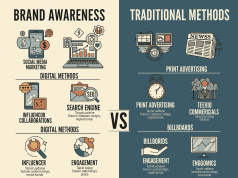As we approach 2025, the marketing landscape is rapidly evolving, shaped by technological advancements and changing consumer behaviors. Marketers must adapt to remain competitive, leveraging innovative tools and strategies to optimize their campaigns. Here’s a look at some transformative innovations that will redefine marketing efforts in 2025.
1. Enhanced Artificial Intelligence (AI)
Predictive Analytics
AI has been a buzzword for years, but by 2025, its applications in predictive analytics will be more robust. Marketers will harness AI to analyze vast amounts of data, enabling them to forecast trends and consumer behaviors with pinpoint accuracy. This capability allows businesses to tailor their messages and anticipate customer needs effectively, optimizing marketing spend and increasing conversion rates.
Conversational Marketing Bots
Chatbots powered by sophisticated AI will truly understand user intent, allowing for more personalized engagement. These bots will not only respond to queries but also qualify leads and assist in closing sales, ensuring customers receive a seamless experience throughout their journey.
2. Augmented Reality (AR) and Virtual Reality (VR)
Immersive Experiences
AR and VR will become mainstream tools for creating immersive marketing campaigns. Brands will employ these technologies to provide customers with virtual try-ons, interactive product demonstrations, and enhanced storytelling experiences. For instance, fashion retailers could allow customers to see how clothing looks on them without ever stepping into a store.
Event Marketing Evolution
Virtual events will only enhance with AR and VR, offering participants realistic experiences from the comfort of their homes. This evolution will expand the reach of brands beyond geographical constraints, enabling them to engage global audiences more effectively.
3. Voice Search Optimization
With the significant rise of voice-activated devices, optimizing for voice search will be vital. By 2025, marketers will have to adapt their SEO strategies, focusing on natural language processing and conversational keywords. Compelling, concise content that answers specific queries will be key to capturing traffic from voice searches, particularly in local marketing.
4. Sustainability and Ethical Marketing
Purpose-Driven Campaigns
In 2025, consumers will demand greater transparency and sustainability from brands. Marketing campaigns that showcase ethical practices and social responsibility will resonate more deeply with audiences. Brands that actively engage in sustainable practices and communicate them effectively will build stronger customer loyalty and trust.
Green Technologies
Innovative marketing tools utilizing green technologies will emerge, allowing businesses to reduce their carbon footprints while reaching their audiences. From eco-friendly digital ads to energy-efficient platforms, the marketing toolbox will support brands focused on sustainability.
5. Data Privacy and Security Innovations
As concerns about data privacy grow, marketers will need to innovate in how they collect, store, and utilize customer data. By 2025, new standards and technologies will streamline compliance while ensuring user trust. Innovations will include decentralized data management systems that empower consumers to have control over their information, aligning with regulations like GDPR and CCPA.
6. Hyper-Personalization Techniques
The move towards hyper-personalization will be grounded in advanced data analytics and AI. In 2025, marketers will deploy these technologies to create deeply personalized experiences across multiple touchpoints. From customized emails to tailored content recommendations based on individual preferences, the marketing toolbox will enable precise targeting, significantly enhancing customer engagement and satisfaction.
7. Blockchain in Marketing
Blockchain technology can revolutionize data security, transparency, and transaction verification. Marketers can leverage this technology to authenticate their supply chains, providing consumers with verified product histories. Additionally, blockchain can enhance loyalty programs, ensuring that rewards and transactions are transparent and tamper-proof.
Conclusion
The marketing landscape is on the brink of transformation as we approach 2025. By embracing these innovations, marketers will have the tools to create more engaging, personalized, and sustainable campaigns. Adopting new technologies strategically, while staying attuned to consumer expectations and ethical practices, will be crucial for brands that want to thrive in the future marketing ecosystem. As we move forward, staying ahead of the curve will not just be an advantage; it will be essential for success.









